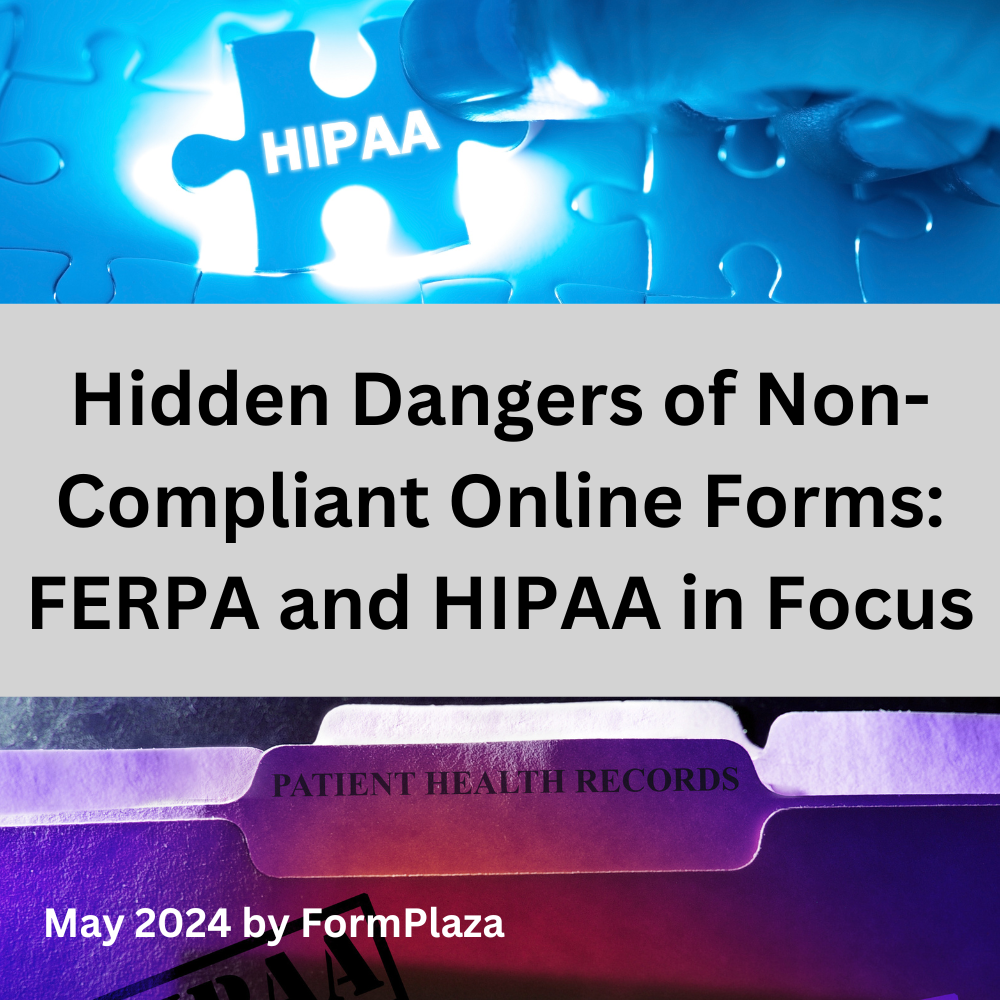Hidden Dangers of Using Non-Compliant Online Forms: FERPA and HIPAA in Focus
Online forms have become an integral part of how we collect, store, and manage data. From educational institutions to healthcare providers, online forms streamline operations, enhance efficiency, and improve user experiences. However, as the convenience of these tools grows, so does the risk associated with their misuse, especially when it comes to sensitive information governed by the Family Educational Rights and Privacy Act (FERPA) and the Health Insurance Portability and Accountability Act (HIPAA).
Understanding FERPA and HIPAA
FERPA: The Family Educational Rights and Privacy Act, enacted in 1974, is a federal law that protects the privacy of student education records. Schools and educational institutions that receive funding from the U.S. Department of Education must comply with FERPA regulations. This act gives parents specific rights regarding their children's education records, which transfer to the student once they turn 18 or attend a school beyond the high school level.
HIPAA: The Health Insurance Portability and Accountability Act of 1996 is a federal law designed to protect sensitive patient health information from being disclosed without the patient's consent or knowledge. HIPAA compliance is mandatory for healthcare providers, health plans, and healthcare clearinghouses, ensuring the confidentiality, integrity, and availability of protected health information (PHI).
The Dangers of Non-Compliance
The consequences of using online forms that are not FERPA or HIPAA compliant can be severe, ranging from legal penalties to reputational damage and loss of trust. Let's delve deeper into the specific risks associated with non-compliance.
Legal Repercussions
FERPA Violations: Educational institutions that fail to comply with FERPA regulations can face serious consequences. The U.S. Department of Education can withdraw federal funding from institutions found in violation. Additionally, schools may face lawsuits from parents or students if their rights under FERPA are breached.
HIPAA Violations: Non-compliance with HIPAA can result in substantial fines and penalties. The Office for Civil Rights (OCR) enforces HIPAA regulations and can impose penalties ranging from $100 to $50,000 per violation, with a maximum annual penalty of $1.5 million for repeated violations. In extreme cases, criminal charges may also be filed against individuals responsible for the breach.
Data Breaches and Privacy Violations
Online forms that do not adhere to FERPA and HIPAA standards are vulnerable to data breaches and unauthorized access. The data collected through these forms often include highly sensitive information such as student grades, medical records, social security numbers, and other personally identifiable information (PII). Unauthorized access to such data can lead to identity theft, financial fraud, and other malicious activities.
Loss of Trust and Reputational Damage
Trust is a cornerstone of any institution, whether in education or healthcare. When a data breach occurs due to non-compliant online forms, it erodes the trust that students, parents, patients, and the public have in the institution. The reputational damage can be long-lasting, affecting enrollment numbers, patient retention, and overall credibility.
Operational Disruptions
Handling a data breach is not just about mitigating immediate damage; it also involves long-term operational disruptions. Institutions may need to invest in additional cybersecurity measures, conduct thorough investigations, and provide support to affected individuals. This can divert resources from other critical areas, hampering the institution's overall effectiveness.
Best Practices for Compliance
Ensuring that online forms are FERPA and HIPAA compliant is crucial for protecting sensitive information and avoiding the aforementioned dangers. Here are some best practices to achieve compliance:
Data Encryption
Encryption is a fundamental practice for protecting data in transit and at rest. By encrypting the data collected through online forms, institutions can ensure that even if the data is intercepted, it remains unreadable and secure.
Secure Access Controls
Implementing strict access controls is essential for limiting who can view and manage the data collected through online forms. Role-based access, multi-factor authentication (MFA), and regular audits can help maintain the integrity of sensitive information.
Regular Training and Awareness
Compliance is not a one-time effort but an ongoing process. Regular training and awareness programs for staff and administrators are crucial for keeping everyone informed about the latest FERPA and HIPAA requirements, as well as best practices for data security.
Comprehensive Privacy Policies
Institutions must have comprehensive privacy policies that clearly outline how data is collected, stored, and used. These policies should be readily accessible to users and should detail the measures in place to protect their information.
Third-Party Vendor Compliance
When using third-party vendors to collect or manage data, it's vital to ensure that they are also FERPA and HIPAA compliant. This includes conducting thorough due diligence, reviewing their security practices, and including compliance clauses in contracts.
Conclusion
The digital landscape offers incredible opportunities for efficiency and convenience, but it also brings significant risks, especially when dealing with sensitive educational and healthcare information. The dangers of using non-compliant online forms are profound, from legal repercussions to data breaches and loss of trust.
Educational institutions and healthcare providers must prioritize FERPA and HIPAA compliance to protect the privacy and security of the individuals they serve. By adopting best practices such as data encryption, secure access controls, regular training, comprehensive privacy policies, and ensuring third-party vendor compliance, these institutions can mitigate risks and safeguard their data.
In the end, compliance is not just about avoiding penalties; it's about upholding the trust and integrity that are fundamental to the mission of any educational or healthcare institution. Investing in compliance measures today will pave the way for a secure and trustworthy future.


